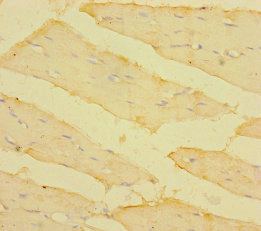TM4SF5 Antibody
-
货号:CSB-PA023620LA01HU
-
规格:¥440
-
促销:
-
图片:
-
其他:
产品详情
-
产品名称:Rabbit anti-Homo sapiens (Human) TM4SF5 Polyclonal antibody
-
Uniprot No.:O14894
-
基因名:TM4SF5
-
别名:TM4SF5 antibody; Transmembrane 4 L6 family member 5 antibody; Tetraspan transmembrane protein L6H antibody
-
宿主:Rabbit
-
反应种属:Human
-
免疫原:Recombinant Human Transmembrane 4 L6 family member 5 protein (112-157AA)
-
免疫原种属:Homo sapiens (Human)
-
标记方式:Non-conjugated
本页面中的产品,TM4SF5 Antibody (CSB-PA023620LA01HU),的标记方式是Non-conjugated。对于TM4SF5 Antibody,我们还提供其他标记。见下表:
-
克隆类型:Polyclonal
-
抗体亚型:IgG
-
纯化方式:>95%, Protein G purified
-
浓度:It differs from different batches. Please contact us to confirm it.
-
保存缓冲液:Preservative: 0.03% Proclin 300
Constituents: 50% Glycerol, 0.01M PBS, PH 7.4 -
产品提供形式:Liquid
-
应用范围:ELISA, IHC
-
推荐稀释比:
Application Recommended Dilution IHC 1:20-1:200 -
Protocols:
-
储存条件:Upon receipt, store at -20°C or -80°C. Avoid repeated freeze.
-
货期:Basically, we can dispatch the products out in 1-3 working days after receiving your orders. Delivery time maybe differs from different purchasing way or location, please kindly consult your local distributors for specific delivery time.
相关产品
靶点详情
-
功能:Acts as a lysosomal membrane arginine sensor. Forms a complex with MTOR and SLC38A9 on lysosomal membranes in an arginine-regulated manner, leading to arginine efflux which enables the activation of mTORC1 which subsequently leads to RPS6KB1 and EIF4EBP1 phosphorylations. Facilitates cell cycle G1/S phase progression and the translocation of the CDK4-CCND1 complex into the nucleus. CDKN1B and RHOA/ROCK signaling activity are involved in TM4SF5-mediated acceleration of G1/S phase progression.
-
基因功能参考文献:
- These results suggest that our novel antibody can be used to detect endogenous and recombinant TM4SF5, and that TM4SF5 may be a possible marker for the poor prognosis of patients with colorectal cancer PMID: 29749436
- The review discusses the antifibrotic strategies that target TM4SF5 and its associated protein networks that regulate the intracellular signaling necessary for fibrotic functions of hepatocytes. PMID: 28458469
- Replacement of the transmembrane 4 L six family protein TM4SF1 or TM4SF4 C-terminus with that of TM4SF5 increased spheroids growth, transwell migration, and invasive dissemination from spheroids in 3D collagen gels. PMID: 28129652
- TM4SF5-miR-4697-3P- CTD-2354A18.1 may play a key role in the pathogenesis of gastric cancer PMID: 26531872
- TM4SF5-positive tumors exhibited locally-increased CD44 expression, suggesting tumor cell differentiation PMID: 25772760
- TM4SF5 interacted with CD151, and caused the internalization of CD63 from the cell surface. PMID: 25033048
- promotes self-renewal and circulating tumor cell properties PMID: 25627085
- TM4SF5-specific monoclonal antibody has a therapeutic effect against colon cancer. PMID: 25268742
- TM4SF5 expression in SNU761 cells caused invasive extracellular matrix degradation negatively depending on IL-6/IL-6 receptor signaling. PMID: 24912675
- Findings demonstrate that TM4SF5 directly binds to and activates FAK in an adhesion-dependent manner, to regulate cell migration and invasion in hepatocellular carcinoma. PMID: 23077174
- TM4SF5 is positively associated with esophageal cancer invasiveness PMID: 23633159
- results indicate that TGFbeta1- and growth factor-mediated signalling activities mediate TM4SF5 expression leading to acquisition of mesenchymal cell features, suggesting that TM4SF5 induction may be involved in the development of liver pathologies PMID: 22292774
- Results indicate that TM4SF5-mediated epithelial-mesenchymal transition may have an important function in the gefitinib resistance of cancer cells. PMID: 22178131
- involvement of JNKs in TM4SF5-mediated p27(Kip1) Ser10 phosphorylation and localization during epithelial-mesenchymal transition. PMID: 22014979
- TM4SF5 expression appeared to cause loss of cell-cell adhesions via proteasome suppression and thereby proteasome inhibition PMID: 21328452
- TM4SF5 plays a central regulatory role in a wide variety of physiological processes through cross-talk with integrins.[review] PMID: 21196261
- Data show that TM4SF5 expression facilitated migration, invadopodia formation, MMP activation, invasion, and eventually lung metastasis in vitro and in nude mice, but suppression of TM4SF5 with its shRNA blocked the effects. PMID: 20506553
- Data suggest that TM4SF5 accelerates G1/S phase progression with facilitated CDK4/cyclin D1 entry into the nucleus, which might be supported by TM4SF5-mediated actin reorganization through cytosolic p27Kip1 expression and Rho GTPase activity. PMID: 20399237
- The ectopic expression of TM4SF5 in Cos7 cells reduced integrin signaling under serum-containing conditions, but increased integrin signaling upon serum-free replating on substrates. PMID: 16828471
- observations have revealed a role for TM4SF5 in causing uncontrolled growth of human hepatocarcinoma cells through epithelial-mesenchymal transition PMID: 18357344
- TM4SF5 in hepatocytes negatively regulates integrin alpha2 function via an interaction between the extracellular loop 2 of TM4SF5 and integrin alpha2 during cell spreading on and migration through collagen I environment PMID: 19789264
显示更多
收起更多
-
亚细胞定位:Lysosome membrane; Multi-pass membrane protein. Cell membrane; Multi-pass membrane protein.
-
蛋白家族:L6 tetraspanin family
-
组织特异性:Intestine. Overexpressed in pancreatic cancers.
-
数据库链接:
HGNC: 11857
OMIM: 604657
KEGG: hsa:9032
STRING: 9606.ENSP00000270560
UniGene: Hs.184194
Most popular with customers
-
-
YWHAB Recombinant Monoclonal Antibody
Applications: ELISA, WB, IF, FC
Species Reactivity: Human, Mouse, Rat
-
Phospho-YAP1 (S127) Recombinant Monoclonal Antibody
Applications: ELISA, WB, IHC
Species Reactivity: Human
-
-
-
-
-























